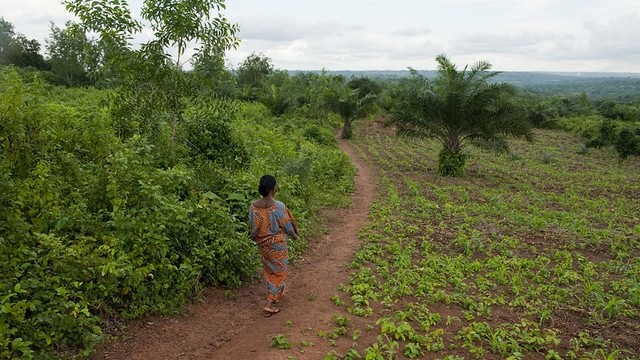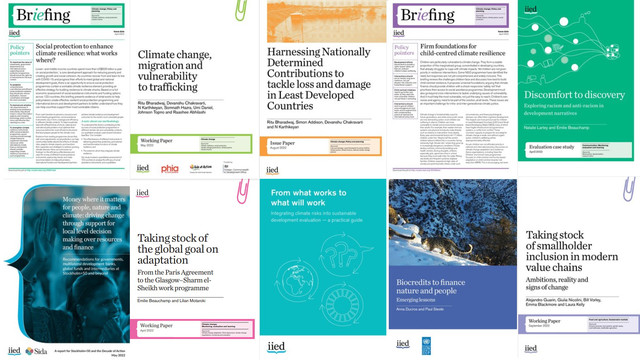IIED's best of 2022: blogs
As 2022 draws to a close, we're showcasing some of the content we've published during the last 12 months. Our blogs offer a place for IIED staff and guest authors to share their personal views and experiences – in case you missed them, here are our top 10 most-read blogs of the year.

A woman farmer in Yanonge, Democratic Republic of Congo (Photo: Axel Fassio/CIFOR-ICRAF, via Flickr, CC BY-NC-ND 2.0)
1. Community-led waste management at scale
Our most read blog of 2022 saw guest blogger Laila Iskandar introduce us to the Zabbaleen – the unsung heroes managing Cairo’s waste – who provide an essential service achieving record recycling rates at no cost to the government.

Informal waste collection and recycling systems rely heavily on local, small-scale, low-tech, labour-intensive methods of collection, recycling and composting. This reduces costs of the overall system closer to the ability and willingness of residents to pay for the service.
2. A changing world needs changing methods: six steps for evaluations to assess “what will work”
Climate change is creating unpredictable futures for sustainable development. Yet, evaluation methods for assessing development progress have remained unchanged. In this blog, Emilie Beauchamp and Stefano D’Errico explained why evaluations must urgently turn from assessing 'what works' to 'what will work' and introduce a new guide to evaluation in a time of climate change.

Evaluations have a critical role to play in responding to climate change by providing the relevant and sustainable bases for designing and adapting sustainable development interventions.
3. The importance of communication for NGOs
A month after completing IIED’s first virtual Communications Learning Week in March 2022, guest bloggers Gathoni Mwai and Vivienne Wendo shared some of their reflections on the importance of strategic communications to help raise local voices so they can contribute to and influence global solutions to our environmental challenges.

Very often, local voices are left out of decision making and discourse because they lack the resources, access or knowledge on how best to position themselves. With so many competing interests, how can local voices get heard?
4. Promoting anti-racist narratives in development sector research
Reflecting on an IIED review, Natalie Lartey explored common challenges in tackling racial bias in the storytelling that underpins international development research and identified opportunities for change.

Most of the stories we tell through development research consistently mask – and by default deny – the race-based oppression, injustice and exploitation that underpin the inequality issues we write about.
5. IPCC report signposts pathways to climate-resilient future for cities
Amid its devastating assessment of the impacts of climate change, the latest IPCC report highlighted the potential of cities to play a major role – analyses Aditya Bahadur.

The report is significant in that cities and settlements are seen as central to the conversation on climate impacts. However, it also underlines the crucial need for swift action that goes beyond appreciation of the extent cities are being affected, to developing effective pathways for climate-resilient development.
6. Confronting structural inequalities in South-North research collaborations
Lorenzo Cotula reflected on the need to address structural factors affecting collaborations across the global North and South, such as entrenched narratives, funding arrangements and deep-seated policy drivers.

Some of the more authentic partnerships I experienced entailed our collaborators accessing resources directly from global funders, with IIED having separate funding or being subcontracted by Southern partners for technical contributions or lesson-sharing.
7. Household energy: a missing ingredient in nutrition debates
A growing body of research is tackling the nutritional and environmental outcomes of food systems together, but is it time to look at the role of household energy in this debate? Researcher Giulia Nicolini looked at the links between energy use, gender roles and nutrition in this blog.

In many cultures, household food preparation is gendered, and viewed as women’s work. When solid fuels are burned during meal preparation, often in unventilated spaces, women and girls are more exposed to indoor air pollution.
8. Locally led adaption in practice: a community-based adaptation expert shares lessons
The principles for locally led adaptation have attracted international support – at the same time, community-based adaptation practitioners are pioneering innovative locally-led action around the world. In this blog, guest writer Pauline Kariuki talked about her experiences and the key questions for this year’s community-based adaptation conference.

Community ownership of initiatives results in better, more careful and more sustainable management of new technologies or local infrastructure that are specific to context.
9. Valuing a traditional lifestyle: how Maasai herders are being paid to protect nature and combat climate change
Guest blogger Jo Anderson shared how a community-run conservation area becomes financially sustainable thanks to carbon revenues.

This locally-led conservation work, funded through the voluntary carbon market, demonstrates that when communities are treated equitably as partners in addressing climate change and biodiversity loss, long-term sustainable solutions are within reach.
10. How women leaders are getting better social protection for the vulnerable
Ritu Bharadwaj and Daljeet Kaur discussed how women leaders in India are showing the way for enhancing access to social protection and delivering climate resilience at scale.

The women are gradually creating confidence and inspiring young girls, women and vulnerable people to stand up for their rights and take charge of the issues that matter to them.
That's our top 10 – but there were many more! To see all our 2022 opinion pieces, visit our blogs page where we give our experts and partners the platform to provide insight into key events, updates on ongoing research, and share experiences from their work.



